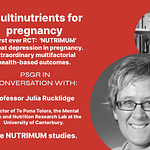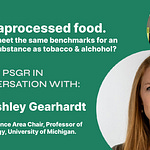Professor Ian Brighthope, MBBS, FACNEM
Founding Director, World of Wellness International - Beyond surviving, towards thriving. wowintl.org
Brighthope Clinics - first integrative medicine clinics in Australia
Founding President, the Australian College of Environmental & Nutritional Medicine, ACNEM. Principle lecturer 1980-2007.
With Professor Avni Sali, formed the Graduate School of Integrative Medicine at Swinburne University in 1996, now National Institute of Integrative Medicine in Melbourne
National Institute of Integrative Medicine - Director of Nutritional & Environmental Medicine.
Honoured by the Indian Nutritional Medicine Association (INMA).
Past president Complementary Healthcare Council of Australia, the peak industry body for Complementary Medicines.
Just a few gems from this outstanding conversation…
Cofactors: Trillions of cells - they all have requirements - water, oxygen, need to be detoxed, biochemical pathways, hydrocarbons, nitrogen, etc.. These pathways require enzymes (proteins) that require cofactors. Cofactors include: Mg, Zn, Cu, pyridoxine (B6), Niacin (B3) vitamins, minerals ... essential trace elements. Every system in the body is affected.
On biochemistry & genes: It depends on your genetics - diabetes or metabolic syndrome or heart disease, but they're all interrelated because the fundamentals are due to the biochemistry. If we mess up the biochemistry then we mess up the genes. Then the genes don't express themselves correctly.
On vitamin D: Sunlight takes the information - Vitamin D to all the receptors in the deepest part of our system. Every cell of the body apart from red blood cells. Every other cell has Vitamin D receptors.
On the ACNEM curriculum: Teaching doctors about nutrients that are going to prevent disease, treat disease, reverse degenerative disease & help patients with severe problems like cancer, heart disease, diabetes, metabolic syndrome & help them to either cure their disease, develop better health, a greater prognosis in terms of survival & rejection of the risks of complications.
On treating comorbid conditions: 3-4 comorbidities? Treat each of those disease states in a very similar way. All respond to vitamin C, trace elements... When you can think this way, it makes it easier to understand the disease process. Inflammation in one tissue is the same as inflammation in the other tissue. The resolution of inflammation doesn't occur with anti-inflammatories, it occurs when you provide the process with the building blocks to stop the inflammation, repair the tissue damage & essentially eliminate the inflammatory response.
On real healthcare: Real healthcare. As doctors we're trained to think & act in terms of diseases. That's all. We're not trained to think & act in terms of making patients healthy. A healthy population doesn't use too many drugs.
On advisory experts: Very cautious about the dosage & intake. Prescribe just enough to prevent overt deficiency disease in the majority of the population. They don't recommend levels that doctors should be using to correct or prevent diseases in genetically susceptible people.


















Share this post